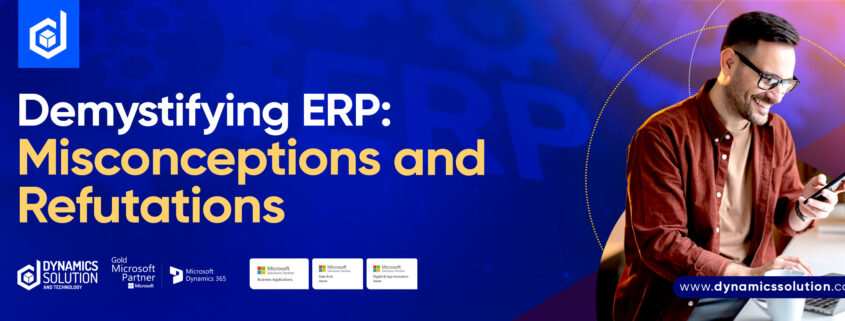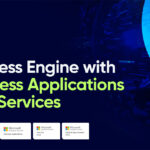Digitally enhancing businesses and enterprises has become an essential need in today’s technologically dynamic world. Enterprise Resource Planning (ERP) offers to unite business processes and aspects in a streamlined and agile manner, for organizations with globally widespread operations. ERP aims to lead businesses to score an enhanced organizational performance by:
- Automating Processes
- Employee Empowerment
- Enhanced Collaboration
- Effective Accounting and Management record-keeping
- Enhanced Scalability
- Industry Compliant Regulations
As versatile and efficient as a solution ERP is, it is a massive change for an enterprise and its employees to embrace. However, unfortunately, humans possess an innate tendency to naturally reject change. Forrester’s Business and Technology Services Survey 2022 reports that 21% of the large-scale firms found implementing organization-wide digital solutions to be their biggest challenge.
The determination of an end-to-end solution like ERP’s success largely rests within the hands of the organization’s employees as their workflows face a major consequent shift.
ERP resistance is a major hurdle in its wide-scale implementation. This resistance is characterized as the uncanny rejection of an ERP software solution. It can arise from factors like instilled phobia of learning a complex software system or various unaddressed misconceptions regarding ERP. ERP resistance within enterprises can be pinned down to the following causes:
- Lack of knowledge on ERP
- Job threat perceptions
- Loss of control due to centralization
- Hesitation with new User Interfaces
How Can ERP Resistance Cause Enterprises to Suffer?
It has become paramount for enterprises to address ERP resistance on a priority basis because otherwise, it carries major disadvantages with it. It is known by industry experts as a catalyst to hinder organizational growth.
The following factors circulating around ERP resistance, if not addressed properly, cause major disruptions within the organization.
- Decreased Efficiency: Rejecting to use ERP streamlined processes results in the organizational efficiency to take a massive hit.
- Forgone Opportunities: Improper utilization of data-driven and real-time insights often results in missing profitable opportunities.
- Inconsistent Data: Employees’ refusal to utilize the latest data entry tools in ERP causes inconsistency in data which leads to data sources becoming outdated.
- Decreased Productivity: A constant state of protest for frustrated employees can specifically cause them to burn out and face decreased productivity.
- Stunted Decision Making: Ignoring real-time data insights can negatively impact the enterprises’ decision making causing poor business strategies to take shape.
- Inability to Acquire Competitive Supremacy: With the organizational rejection of ERP systems, it becomes tough for businesses to acquire an edge against their competitors.
Common Misconceptions Regarding ERP
As a technically vast solution, ERP is perceived in both negative and positive lights. While it may have some cons according to some experts, it is mostly seen as a groundbreaking solution for business management.
However, there are some common misconceptions that drive ERP resistance among organizations and individuals.
It is Technically Complex.
Digital evolution naturally results in novel technical tools that, even though they make processes simpler, might be daunting for people with no exposure for them.
ERP Solutions are Only for Large Enterprises.
Since the name refers to enterprises, it is mistaken that ERP, SaaS or cloud-based is only for large enterprises.
ERP Implementation is Time-consuming.
Since the implementation is organization wide and requires precision and detail, therefore it is often misunderstood that ERP implementation is time-taking.
It Causes Data Breaches.
Automating business processes are often perceived to put organizational data at risk, due to malware attacks and hacks.
ERP Causes Company-wide Layoffs.
Automation is commonly perceived as technology taking over human jobs. It is a misconception that simplifying mundane tasks equates ERP eradicating employees’ value.
ERP Implementations are Exorbitant.
Non-technical employees are daunted by ERP as a concept so much that unfortunately, they deem it inaccessible due to unaffordability.
ERP Only Caters to Manufacturing Industries.
Even though it was originally true when ERP was introduced, this is a widely perceived misconception now because ERP’s evolution has been ignored.
ERP Cannot be Customized:
It is widely misperceived that ERP solutions deliver a one-size-fits-all approach and consequently, companies are forced to change their processes to accommodate it.
Refuting Common ERP Misconceptions
For organizations to thrive on the benefits of ERP and instill a sense of acceptance among employees for ERP implementation, it is paramount to refute the misconceptions prevalent about ERP and shed light on its real and lasting impacts.
Compiled below are certain refutations regarding the misconceptions centered around ERP, that aim to dispel the resistance that revolves around it.
ERP Caters to Large Enterprises as well as SMEs.
ERP, in the current age, has dynamically evolved to be customizable to provide value to both large-scale manufacturers as well as SMEs. ERP is modular and scalable, which has significantly expanded its audience range. This scalability and its division into various modules allow ERP to cater to enterprises of all sizes.
ERP Implementation is No Longer Time-Consuming or Complex.
Even though ERP needs a dedicated team of technical resources for implementation, its evolution has simplified its deployment process significantly. The tools incorporated in ERP are efficiently user-friendly, hence, that rules out the misconception around their complexity as well.
ERP Leverages Data Security to Minimize the Risk of Breaches.
Present day ERP systems are built to rigorously practice data security to safeguard organizational data. ERP employs robust network security infrastructures and firewalls to control and monitor the traffic accessing organizational data.
ERP Empowers Employees Instead of Replacing Them.
ERP is designed to simplify time-taking tasks and give employees room to be more productive in achieving major goals. Furthermore, ERP processes data to enable employees to analyze it and derive actionable strategies from it. ERP enables employees to have more room to be productive and produce out-of-the-box strategies, since they are free from the duress of menial tasks.
ERP is Affordable.
The misconception regarding ERP’s lack of affordability is ruled out by its modular and flexible nature. Companies can opt for important modules like Sales, Supply Chain Management etc. in their customizable ERP plan and can opt out with the modules that do not require ERP’s assistance. The customizable aspect of ERP makes it affordable for enterprises.
Microsoft Dynamics ERP Benefits
Microsoft offers a fully functional suite of integrated applications that cater to the specific ERP needs of enterprises. Dynamics 365 ERP efficiently centralizes business management needs like supply chain, sales, manufacturing, human resources etc. It empowers organizations to efficiently streamline their backend operational functionalities, while leveraging its excellent capacity to deliver insights as well.
Forrester, in a report analyzing the economic impact of Microsoft Dynamics 365 Sales, an essential aspect of the ERP eco-system, pointed out that it brings businesses a 215% ROI (Return on Investment) in a span of over three years.
The below discussed features assimilate the misconceptions surrounding ERP, under the Dynamics 365 ERP umbrella.
- Dynamics 365 ERP is highly scalable and modular, enhancing its affordability to various enterprises. In fact, Dynamics 365 has a separate ERP business application called Business Central, which specifically caters to SMEs (Small and Medium-sized Enterprises). Business Central offers functionalities like Dynamics 365 ERP but on a smaller scale.
- Dynamics 365 ERP comes with a mobile app that aims for ease in accessibility. This enables teams to remotely access any of its tools or insights. Businesses do not have to rely on complex gadgets to be able to access their ERP applications.
- Dynamics 365 leverages the analytical power to AI to process enterprise into actionable insights. These insights empower employees to use them and build novel strategies that enhance their productivity. Dynamics 365 frees up employees by automating data processing and analytics, which gives them room to be more productive.
- Dynamics 365 ensures data security by employing industry-standard encryption and multifactor authentication. A fool-proof security system ensures a minimized risk of data breaches.
- Dynamics 365 easily integrates with Microsoft Office tools. This provides users with a familiar environment to work in, making them comfortable and significantly refuting the claims of ERP’s complexity.
Hence, Microsoft Dynamics 365 ERP and Business Central provide ease of use with maximum productivity for enterprises of all sizes. While addressing ERP misconceptions, it is integral to highlight its benefits for both enterprises and employees, so that a sense of acceptance can be instilled.
Addressing Change Resistance with a Perspective Shift: Change Management
Before addressing ERP resistance, it is important to shift the perspective on change management. From seeing it as a crisis to be tackled with, it is paramount for the leadership to instead perceive it as a skill that needs to be developed in employees.
Forrester’s report has showed that traditional change management techniques have proved to be redundant in addressing resistance to digitally transforming businesses. Instead, they need to reassess the entire situation and make peace with specific realities like:
- Change is constant, so they need to stop preaching ‘there is light at the end of the tunnel’ to their employees.
- This is not a battle and not everybody is supposed to win in this. Leadership and employees must realize that skills become obsolete and organizational structures are bound to shift, with layoffs always possible.
- KPI needs to change, with the incentives as well. If everything else is subject to change, then these two aspects need to be shuffled around as well for employees to keep perceiving incentives as motivation.
- Overcommunication might be the key. For change management to be successful, leadership needs to listen more and talk less, keeping the communication targeted towards employee concerns.
Harness the Formidable Potential of Dynamics 365 ERP Solutions with Dynamics Solution and Technology
With an overarching solution like ERP, that aims to boost organizational growth and exceed customer expectations, businesses need a service provider which ensures an impeccable deployment of the ERP software, be it on-premises or cloud-based. Dynamics Solution and Technology acknowledges how a seamless integration of Dynamics 365 or Business Central can turn them into irreplaceable tools that can help your company’s growth, productivity and customer satisfaction reach insurmountable heights.
Our Microsoft Solutions Partner status is testimony to our expertise in implementing efficient solutions. Furthermore, our ever-expanding list of satisfied clienteles, exceeding beyond the boundaries of GULF and MENA regions and moving into Europe, also reiterates our never-ending commitment to excellence.
If you think your business enterprise is missing the Dynamics 365 or Business Central element in reaching new heights in productivity, profitability, and performance, contact us today and schedule a demo.






